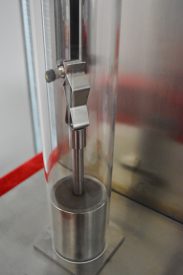Firstly , igniting the sample, start the time immediately and observe the burning time and combustion characteristics of the sample. If the combustion is suspended, but spontaneous reignition within 1 second, continue to observe and timing. If the burning time or burning length of the specimen does not exceed the form requirements, the test is recorded as an "O" reaction and the burning length or time is recorded. If one of the two exceeds the provisions in the table, the flame is extinguished and the test of the "X" reaction is recorded. Also record the combustion characteristics of the material, such as: droplets, soot, charcoal, drift combustion, combustion, afterglow or other characteristics that need to be recorded. If there is no burning flame, flammability should be reported as required, or include the oxygen index at flameless combustion.
Remove the sample, wipe the combustion tube and the ignition surface of the dirt, so that the temperature of the combustion tube back to room temperature or another for the room temperature combustion tube, the next test. If the sample is long enough, the sample can be reversed or the re-used burned part is cut off. But can not be used to calculate the oxygen concentration. According to the above method, a set of samples was tested using the specific conditions of the "small sample lift method" as the amount of change.
That is, if the combustion behavior of the previous sample is "X", the oxygen concentration is reduced; if the previous sample has a combustion behavior of "O", the oxygen concentration is increased. This test is repeated until the secondary oxygen concentration below the volumetric fraction does not exceed 1.0% and is O; after the any reaction is carried out at any suitable step. The reaction of this set of oxygen concentrations is referred to as the initial oxygen concentration Initial oxygen concentration Ψ. The above steps are repeated and the "X" or "O" response corresponding to Ψ0 is recorded. Is the first value of the NL series.
